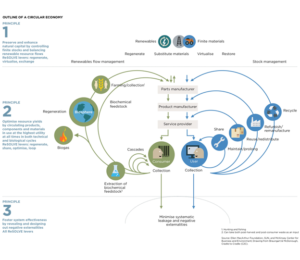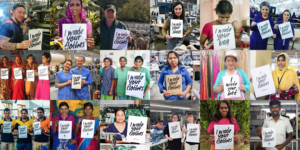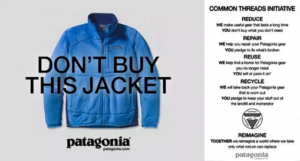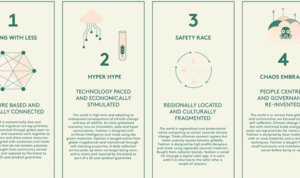Clothes are an everyday necessity and for many a central part of self-expression and creativity. Fashion, however, is a dirty business. The current fast-paced production of clothes is incredibly resource intensive, wasteful, exploitative and pollution-heavy.
According to the United Nations “the fashion industry, including the production of all clothes which people wear, contributes to around 10% of global greenhouse gas emissions due to its long supply chains and energy intensive production. The industry consumes more energy than the aviation and shipping industry combined.”
Besides the emissions associated with today’s fashion industry, every item of clothing comes with a cost – both environmental and social.
According to the documentary film River Blue, one fashion brand will use over 28 trillion gallons of water every year. In addition to the actual use of precious drinking water, clothing manufacturers are dumping toxic chemicals into nearby rivers which are killing off animal life, contaminating water and sky-rocketing occurrences of death and disease in affected people.
People are also affected in the way of workers exploitation. Garment workers are forced with unsafe working conditions and being paid far below a living wage.
But there is hope. The Fashion Transparency Index reports that there’s been a “280% rise in tier-one supplier transparency from fashion brands since 2016.”
We are seeing greater pressure and demand to transform the fashion industry to be ethical and sustainable whilst incredibly innovative and exciting transformations are already afoot.
Here are just five examples of trailblazers in the sustainable fashion space.
The Ellen MacArthur Foundation – Promoting a shift to circular economy
In 2010, Dame Ellen McArtur launched the foundation to promote a paradigm shift towards a circular economy, particularly in the fashion industry. The circular economy looks at moving away from the current linear model of our economy which is to take-make-dispose. Circular economy transcends our current extractive industrial model by “gradually decoupling economic activity from the consumption of finite resources, and designing waste out of the system.”
Circular economy is underpinned by a transition to renewable energy sources and building rather than depleting natural and social capital. It is based on three principles:
- Design out waste and pollution
- Keep products and materials in use
- Regenerate natural systems
Fashion Revolution – Ending exploitation and ecological damage caused by fashion
Fashion Revolution is a group of “designers, academics, writers, business leaders, policymakers, brands, retailers, marketers, producers, makers, workers and fashion lovers” who aim to “unite people and organisations to work together towards radically changing the way our clothes are sourced, produced and consumed, so that our clothing is made in a safe, clean and fair way.”
Fashion revolution hosts a number of online and offline events all over the world, including the annual Fashion Revolution Week which put pressure on brands to reveal #whomademyclothes.
The organisation has released a manifesto with ten principles to which the fashion industry should uphold itself and are engaging with top fashion brands through their transparency index.
Patagonia – Subscribing to activism as a modern clothing brand
As far as large clothing brands leading the way on sustainable fashion practices goes, Patagoina comes out top. Patagonia proudly markets themselves as an “activist company” and attempts to transparently prove why they deserve that name. Patagonia actively practices responsible resource management whilst promoting longer-use and better care of their products in order to reduce consumerist impact.
The company transparently communicates their journey to improve their supply chain and reduce their carbon footprint whilst even taking part in direct action and activism. Their central focus is on the lives of their workers. Considering the current environmental crisis we face currently, we need more companies to take an active stand like Patagonia has.
Kye Shimizu – Using technology and tradition to decrease fashion waste
According to Sustainable living platform Twyg Mag, “Kye Shimizu is not a fashion designer, but his Algorithmic Couture project has created a new convention for fashion,” using code to eliminate waste and make fashion sustainable.”
Kye is the co-founder of Synflux, a Tokyo-based research collective that focuses on design research and fashion design. Together with is co-founders Yusuke Fujihira, Kotaro Sano, and Kazuya Kawasaki, they developed a system which has taken the concept of traditional Japanese straight-line pattern cutting and combined it with technology,
The Algorithmic Couture project:
- captures body measurements and data of a customer,
- then creates a 2D zero waste digital patterns using straight lines;
- outfits are designed using these straight line patterns in collaboration with a designer;
- the customer is able to customize color and fabric type;
- outfit is made to fit the consumer whilst avoiding fabric waste.
Forum for the Future – Open source information for the future of fashion
In partnership with the Centre for Sustainable Fashion at the London College of Fashion and with
support from C&A Foundation, Forum for the Future has launched Fashion Futures 2030, “an open-source learning toolkit to help fashion businesses plan for future scenarios with sustainability in mind.”
The toolkit uses four vivid scenarios which explore topics such as:
- climate change
- resource shortages
- population growth
- and other factors that will shape the world of 2030 and the future of the fashion industry.
The next 10 years are going to be some of the most important in the entire human history. All individuals, governments and industry will have to make widespread unprecedented changes if we are to avoid climate catastrophe and further devastating biodiversity loss. Embracing sustainable and ethical fashion practices is one of the most important ways of doing this.
Do you want to make a difference to the fashion industry?
Sumas offers a range of sustainable fashion courses and degrees:
- BBA in Sustainable Fashion
- MBA in Sustainable Fashion
- Master in Sustainable Fashion
- Online MAM in Sustainable Fashion
- Online MBA in Sustainable Fashion
Contact us on info@sumas.ch to find out more.
Research Links
https://www.fashionrevolution.org/manifesto/
https://www.ellenmacarthurfoundation.org/circular-economy/what-is-the-circular-economy http://twyg.co.za/using-high-tech-design-kye-shimizu-wants-to-change-fashion-for-good/
https://www.fashionfutures2030.com
http://twyg.co.za/using-high-tech-design-kye-shimizu-wants-to-change-fashion-for-good/





